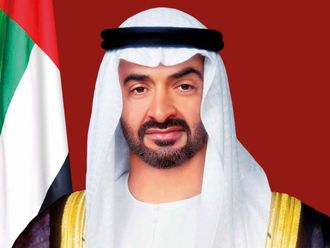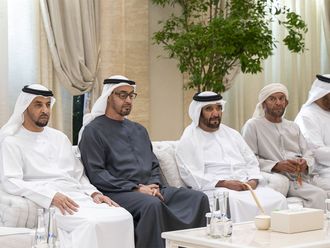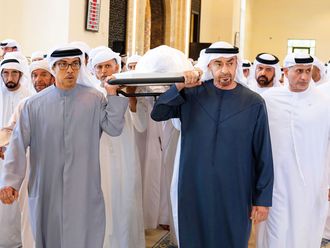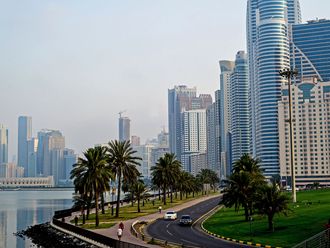Abu Dhabi: Though the UAE has one of the lowest unemployment rates in the Middle East and North African region, joblessness among Emirati is at 20 per cent according to the National Statistics Bureau figures released recently.
The results have prompt the UAE government and the Ministry of Presidential Affairs to launch an initiative called ‘Absher’ to support young Emiratis who seek jobs in the private sector.
The UAE’s National Bureau of Statistics said unemployment among nationals had reached 20.8 per cent in 2011.
For its part, the Abu Dhabi Tawteen Council said that the number of Emirati jobseekers reaches 13,000 annually, 80 per cent of whom are female, most holding a high standard of qualification.
Saqr Gobash, UAE minister of labour, told Gulf News that Emiratis sought work in the government as it is easy to access and that many jobs at the private sector have low wages.
“The presence of Emiratis in the private sector is weak. Many UAE nationals seek to work in the public sector because it is easy to access, it offers more incentives and carries a lot of benefits and advantages,” said Gobash.
“Most jobs are low-skilled, low-paid ones and labour-intensive, Gobash said, adding that such jobs are not suitable for UAE citizens.
He explained that the ministry and the government are facing to major challenges.
“The challenges are that wages are much higher in the public sector and the public sector offers stronger job security,” added the minister.
He added: “The UAE has a competitive economy driven by knowledge and innovative people. Thus, this falls upon the private sector to promote job placement for nationals.”
Gobash pointed out that UAE nationals have to be informed of new opportunities and the government should increase their awareness of the programmes and initiatives available.
Gobash said that the ministry has sent a quota for the banking and financial firms.
“The banking sector is looking to increase its Emiratisation targets by four per cent on an annual basis to reach 45 per cent of its staff to be UAE nationals — up from the current 35 per cent,” said Gobash.
Emirates Nationals Development Programme, set up in 2005 to help nationals to find jobs in the private sector, said that the UAE banks and financial institutions are approaching the quota set by the government for Emiratisation of banks and financial institutions.
Hamad Al Qatami, Minister of Education, told Gulf News that the ministry provides training and is joining efforts to bridge the gap.
“We are working hard with our stakeholders in the government and in the private sector to create job opportunities and to rehabilitate young Emiratis to join the private sector,” Al Qatami added.
Hareb Al Muhairi, UAE vice-president of Etihad Airways, told Gulf News: “We are hiring nationals and since there are differences in the salaries between the private and public sectors, the initiative will help bridge the gap in salaries and offer discounts and other advantages to the Emiratis working in the private sector.”
For her part, Muna Waleed, vice-president of Talent acquisition of Etihad Airways, told Gulf News that Emiratisation is a top priority for the government and for Etihad Airways.
“Tawtween is a priority. We are supporting this initiative and we have already hired 344 Emiratis so far at various levels. We also offer them some training and rehabilitation programmes to meet the challenges of job at Etihad.
Waleed added that Etihad is hoping to hire 1,500 Emiratis over five years.
The Council of Ministers issued a resolution on Monday declaring 2013 as the year of creating jobs for UAE nationals and for Emiratisation of jobs.
The launch ceremony was attended by senior government officials, dignitaries and representatives of the private sector companies.
UAE Central Bank Governor, Nasser Al Suwaidi, told Gulf News that the Central Bank supports the initiative and works with stakeholders on hiring Emiratis.
“We are fully supporting this initiative which is for the sake of our people. There are so far 16,000 Emiratis working in the banking sector and we expect the number to increase further soon based on the quotas allocated by the government,” said Al Suwaidi.
“We are eying the 45 per cent Emiratisation target in the banking, financial and insurance companies,” said the governor.
Mohammad Ahmad Al Mur, The Federal National Council Speaker, told Gulf News that the government has to find the best solutions to Emiratise and to provide job opportunities for nationals.
“There is a need for turn the resolution taken by the Cabinet for the short and long term into action soon,” said Al Mur, hailing the initiative “as a gateway to increase the percentage of Emiratis in the workforce in the private sector.”
James Hogan, Etihad Airways’ president and chief executive, said: “Etihad Airways is proud of its position as one of the foremost employers of UAE nationals and for our continued drive to attract and recruit Emirati members of staff to our workforce.
“As a result of Etihad Airways’ award-winning recruitment strategy and programmes, Emiratis now comprise 21 per cent of our core workforce, with more than 1,000 UAE nationals employed across the airline’s seven divisions.
“Etihad Airways recognises the importance of developing a UAE national workforce and we will continue to offer world class training and development opportunities across the diverse field of aviation.”
Mohammad Al Mortada Al Dandashi, partner and managing director of Al Ramz Securities, said: “The private sector is viewed negatively by many young Emiratis who, having grown up in a society of public sector jobs with high benefits, view private employment as poorly-paid, hard work with few benefits.”
Al Dandashi added: “Nonetheless, young Emiratis defy the idea that they would be unwilling to work for a private company, with many expressing eagerness to do so. Defying another popular conception, Emirati youth view issues of gender and culture as marginal to their employment preferences.”
Abdul Aziz Al Sawaleh, group chief human resources officer for Etisalat, told Gulf News that the company has been working on Emiratisation for many years now.
“About 41 per cent of our employees are Emiratis at various job positions. There are about 3,000 Emiratis working for the company so far and the number will increase along with the Absher Initiative,” said Al Sawaleh.
Saeed Abdul Jaleel Al Faheem, chairman of Al Faheem Group, said: “We highly appreciate this initiative which shows the concern of the President about the Emiratis.
“The initiative reflects that the President of the UAE is highly concerned about their issues to secure stabilised living and a decent life,” said Al Faheem.
Emirates Nationals Development Programme, set up in 2005 to help nationals to find jobs in the private sector, said UAE banks and financial institutions are approaching the quota set by the government for emiratisation of banks and financial institutions.
“UAE banks and financial institutions are using the country’s Tawdheef Recruitment Show to support their ambitious 45 per cent Emiratisation target, as the sector continues to boast the largest Emirati workforce among private companies, said Emirates Nationals Development Programme in a statement.
Tawdheef, which is supported by the ENDP, and organised by Informa Exhibitions, returns after a highly successful showing earlier this year when 95 companies presented more than 2,000 positions for qualified UAE Nationals.
Abdul Baset Al Janahi, CEO of the Mohammad Bin Rashid Establishment for Young Business Leaders in Dubai, said small businesses play a key role in reducing unemployment but are limited in scope.
Booz and Company said that the UAE government had tried hard to solve this issue recently by quotas and by contribution.
“The UAE government has tried to solve the unemployment issue by adopting two major initiatives: setting quotas for hiring nationals and contributing to the cost of hiring them,” Samer Bohsali, a partner with Booz and Company.
Matthew Gibble, managing director of Michael Page Middle East, told Gulf News that besides the government sectors, today most Emiratis are attracted to roles in security and defence, human resources, public and private sector organisations, marketing and communications as well as banking and finance.
If there are jobs available with acceptable salaries in fields that are not typically attractive to the local community, then we would start to see a shift and a move towards those fields, he said, adding that there has been generally a huge favour on Emiratisations over the past year.
For instance in the hospitality sector, less than five per cent of the hotel workforce is Emirati, most of it based in Dubai, said Kamal Fakhouri, vice-president and chief operating officer of Cristal Hotels and Resorts.
“They [Emiratis] are not really geared to work in the hospitality industry,” he said. “They would prefer finance and banking.”
Fakhouri also said that the hotel industry is one of he lowest paid. “I think they would have to subsidise because generally our salary structure doesn’t encourage them to join,” he said.











